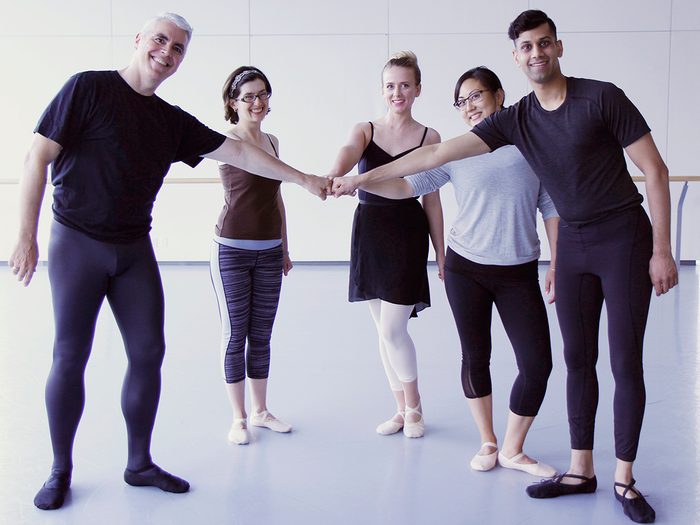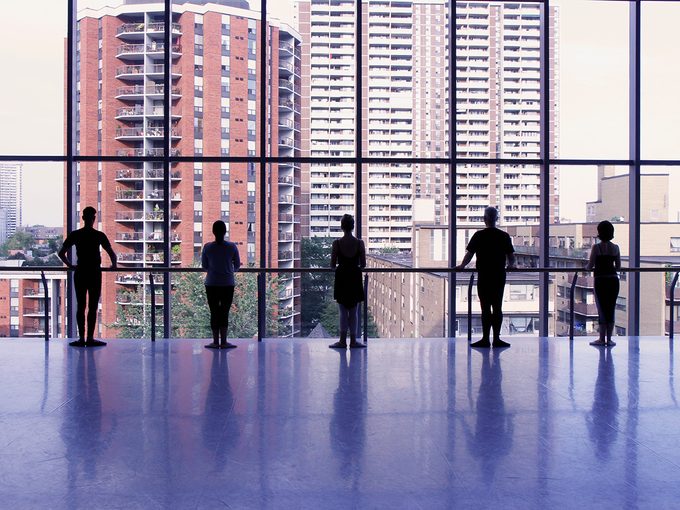“I Joined an Adult Ballet Class at Age 41”

I don’t wear a tutu and my pirouettes are lopsided at best, but ballet class is the best hour and a half of my week.
When I enrolled in my first adult ballet class, I was nervous. At age 41, would I be flexible enough? Graceful enough? Would I survive the scrutiny of the wall-to-wall mirrors?
(Related: The Benefits of a Ballet Inspired Workout)
The first thing that shocked me when I entered the studio was that our teacher addressed us as “dancers.” Never mind that the students—our bodies variously shaped and decidedly un-balletic—ranged in age from our early 20s to 60-plus, or that we couldn’t hold our balance for longer than two seconds. In this space we had a new identity, and it made us all stand straighter.
Seven years later, I’ve become something of a proselytizer for adult ballet. I don’t wear a tutu and my pirouettes are lopsided at best, but ballet class is the best hour and a half of my week.
Earlier this year, I took the leap and signed up for more: a week-long summer ballet intensive at the National Ballet School of Canada in Toronto. It was a physical adventure my body had never experienced: three hours of activity a day, which included conditioning for dancers and ballet class, with time to hone our technique at the barre. The last hour was reserved for learning choreography—in our case, the harvest dance from Giselle. But most daunting was the fact that the week culminated in a performance for family and friends.
I have long been accustomed to public speaking and lecturing to large audiences, but performing in a ballet recital as a 40-something adult was a new one for me. I invited my parents and husband somewhat reluctantly. I’d never stood in front of people while wearing a body-hugging outfit, postural deficiencies and flabby abs on full display. But once the pianist played our opening and we assumed our positions, then began to move in formation as a real corps de ballet, I stopped thinking about how I might be perceived. Instead, I smiled, breathed in, imagined the top of my head reaching toward the ceiling and let my body present the movements it had been perfecting all week. I stopped judging my every bodily infelicity, quieted any fears and just danced, suspended in time.
Though the French terminology might sound intimidating at first—plié, tendu, rond de jambe—I can assure you that the movements quickly become familiar, and the warm-up sequence of barre exercises turns into a meditative practice. This 45-minute barre that begins each class is a full-body workout that fires up every muscle, joint and tendon—including ones you didn’t know you had!—while focusing on alignment and the plumbline of the body, which runs from the top of your head right down to your feet.
(Related: You’re Going to Need to Work on Your Balance)
Physician Kate Reilly, a family and sports doctor in Toronto, explains that in addition to building flexibility, core strength and balance, ballet class is also a mental workout: memorizing the sequence of steps and coordinating precise leg movements with fluid arms, while keeping time with the music and remembering to breathe. As we negotiate these complex combinations, says Reilly, it activates multiple parts of our brain, with our “motor cortex, visual and auditory centres working simultaneously.”
The time spent at the barre sets the body up for the more challenging, unsupported movements in the centre of the studio, which combine graceful arm gestures (ports-de-bras) with leg extensions and jumps that feel like an intense cardio workout. By the time we’re dancing choreographed sequences along the room’s diagonal, most of us are beaming, not because we’ve mastered the steps, but because we have the confidence to travel through space in a wholly new way.
Reilly began ballet lessons two years ago to better understand her patients—many of whom are high-performance athletes—but also as a way to “work on the insecurity of just not being immediately great at something,” she explains. She also loves the mindfulness of ballet.
The adult studio is a place of inclusion and deep care for the body: Every exercise is modified to adapt to the students in the room. Unlike pre-professional training for young dancers, which has highly specific body requirements, the definition of an adult ballet body is simple—one that moves, no matter its proportions. Along with that comes strength, grace and awareness.
It’s no coincidence that the class ends in a reverence—a gesture of thanks to the teacher, the pianist, our peers and, most of all, our own bodies, for the magic they are (still) capable of.

3 Health Benefits of Ballet
1. Improved balance
As we age, our balance declines, especially after our mid-50s. But ballet requires dancers to spend time on one leg while moving their arms, hands, neck and head, as well as rising on tippy-toes and conducting single leg lifts that transfer weight from one leg to the other. Sometimes these movements are done with eyes closed to improve proprioception, a neuromuscular sense of the body’s position in space (which dulls with age if we don’t exercise it). Balance work can improve longevity and help prevent falls—there are even studies connecting a reduction in mortality with the ability to balance on one leg for 10 seconds.
2. Better body alignment
Because we spend so much time at our desks or glued to devices, our posture can often suffer. Ballet increases body awareness and emphasizes lengthening your body by creating space between your vertebrae; as you dance, you can imagine your tailbone reaching toward the floor and your torso stretching so tall that you can almost feel confetti erupting from the crown of your head.
3. Mental health and perfectionism
Ballet helps us become more comfortable with failure. It’s also about the joy of doing something without having an end goal in mind. Kate Reilly, the sports doctor in Toronto who started ballet classes as an adult, explains it this way: “As a very type-A person who is used to succeeding, I often have the mindset of, ‘If I’m not good at it right away, why bother?’ And ballet challenges that mindset.”
Next: 9 Ballet Stretches to Do for 10 Minutes a Day to Improve Your Flexibility




